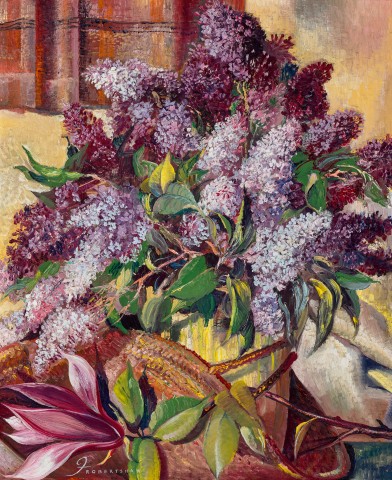PURPLE STILL LIFE, c.1940
FREDA ROBERTSHAW
oil on composition board
53.0 x 45.5 cm
signed lower left: F ROBERTSHAW
bears inscription on tape verso: PURPLE STILL LIFE / c.1940 / $8000 / FREDA ROBERTSHAW
Roland and Beatrice Instone, Sydney
Thence by descent
Estate of Beatrice Instone, Sydney
Sotheby’s, Melbourne, 22 April 1991, lot 236
Joseph Brown Gallery, Melbourne, acquired from the above
The Cbus Collection of Australian Art, Melbourne, acquired from the above on 29 April 1991
Bloomin’ Art, Wollongong City Gallery, New South Wales, December 2002 – May 2003
In Bloom, Gippsland Art Gallery, Victoria, 19 August – 14 September 2014
on long term loan at Wollongong City Gallery, New South Wales
Nainby, B., Stanhope, Z., and Furlonger, K., The Cbus Collection of Australian Art, in association with Latrobe Regional Gallery, Melbourne, 2009, pp. 19, 64 (illus.), 231
Freda Robertshaw is not a name with wide recognition, yet she is responsible for two undeniable masterworks in Australian art history. These are her still-striking Standing self-portrait, c.1944 (Cruthers Collection of Women’s Art, Perth), the first known nude self -portrait by a woman in this country; and Australian beach pattern, 1940 (Collection of Joy Chambers-Grundy and Reg Grundy AC, OBE) – her female-centric take on Charles Meere’s own Australian beach pattern, 1938-40 (Art Gallery of New South Wales). Both were executed whilst working as Meere’s studio assistant where she was trained in his personalised neo-classicist technique. In spite of her absolute mastery of his style (indeed, some of her paintings have been mistaken as his), Robertshaw’s own preference was for a less idealised approach favouring still-lifes and landscapes. Purple still life, c.1940, is an excellent example of these and shares close affinities with Spring flowers, 1940s (National Gallery of Victoria).
Originally trained at East Sydney Technical College from 1932 under such teachers as Rayner Hoff, Meere, and Herbert Badham, her fellow students included Barbara Tribe and the now-notorious Rosaleen Norton. In many ways, Purple still life is a painting which jostles deliberately between Meere’s rigidity and a looser, more expressive tone imparted by the pronounced gestural brushwork of the central flowers (purple Lilac). The scene is domestic, with the gridded pattern of the curtains at upper left acting as a counterpoint to the organic forms below, augmented by the unusual placement of a woven shopping bag enveloping the ceramic pot. In a possible nod to Meere, Robertshaw includes a beautifully delineated magnolia lying at the base just above her own stylised signature, further indicating that Purple still life is a painting which straddles two extremes in the artist’s practice.
Robertshaw was a regular finalist in the Sulman Prize and, apart from those listed above, examples of her work may also be found in the collections of the National Gallery of Australia, Benalla Art Gallery, and the Art Gallery of Western Australia.
ANDREW GAYNOR
